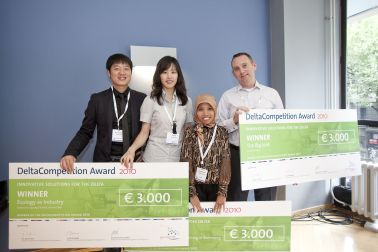In cooperation with Royal Haskoning and the City of Rotterdam, Delta Alliance organized the DeltaCompetition2010. This worldwide competition challenged students to come up with creative and innovative solutions for delta cities that are under increasing pressure due to climate change. The three winning submissions were presented during the conference ‘Deltas in Times of Climate Change’ on September 30 in Rotterdam.

In total, the competition attracted 24 high quality submissions from students all over the world. The Panel of Judges, consisting of Prof. Sybe Schaap (Delft University of Technology, former chairman Union of Waterboards), Prof. Pier Vellinga (Director Knowledge for Climate Programme, Wageningen University), Prof. Hans Opschoor (Free University Amsterdam), and Tom Smit (Royal Haskoning), was impressed by the range of subjects and the innovations of this year’s contenders. The ten best submissions are published in the DeltaCompetition2010-book. The three winning teams presented their designs during the conference - their ideas are described below.
Ecology as Industry
by Haein Lee, Gyoung Tak Park, and Soomin Shin from Harvard University, United States
Ecology as Industry is a long-term vision for de-engineering water management in The Netherlands. The group presented a regional plan for capitalizing upon the local ecology while addressing increasing flood hazards and land subsidence. To achieve this vision they propose four transformations, which include multi-use de-poldered areas, constructing barrier islands, relocating port activity, new industries of aquaculture and alternative energy production and an expansive recreational landscape. These specific measures were incorporated into a strong overall vision. Ecology as Industry illustrates that the issues facing delta cities require regional approaches that view the delta as a landscape system.
Groundwater Zoning as Spatial Planning in Semarang
by Novi Rahmawati from Gadjah Mada University, Indonesia
The Semarang delta, like many of the world’s deltas, is encountering increasing flooding problems due to land subsidence. In parts of the delta land subsidence due to groundwater exploitation and construction loads exceeds 16 cm per year. The concept of groundwater zoning – spatial planning identifies the areas most degraded and at risk of degradation through groundwater abstraction – was considered a very practical solution. The jury recognized the importance of combating subsidence in Semarang and considered Novi’s idea as a very practical solution. She supported her idea with modeling of the groundwater flow and detailed data. The solution is applicable and highly relevant for many deltas around the world.
The Big Leak, Adaptive responses to New Orleans' land subsidence crisis'
by David Wooden of Virginia University, United States.
The Big Leak proposes an adaptable stormwater conveyance system that intentionally “leaks” to maintain water tables in the city. By replacing the current stormwater conveyance system with surface canals that would act as an ex-filtrating infrastructure for recharging the water table, and thus stopping or reducing the rate of land subsidence. The Big Leak is an intelligently crafted concept for combating subsidence, and offers an integrated and very applicable solution for a sinking city. The jury was impressed by the innovative idea, detailed design of the solution and excellent presentation of this paper.
Booklet: Innovative Solutions for the Delta, Innovative ideas for deltas cities to respond to climate change challenges in the complex urban environment. DeltaCompetition 2010. Published by Royal Haskoning, in cooperation with Delta Alliance.



